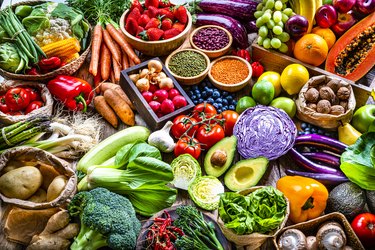
Lymphedema is a type of swelling that occurs, usually in an arm or leg, when the body's lymph system s damaged or blocked, says the National Library of Medicine. Experts say diet is a key part of managing lymphedema. Avoiding salt, eating a balanced diet and staying hydrated can help.
Read more: Exercises for Lymphedema in the Legs
Video of the Day
Video of the Day
What Is Lymphedema?
Lymph is fluid that runs through a network of tubes in your body to remove waste, bacteria and viruses from tissues. Think of it as part of a filtration system. It carries the waste through the lymphatic system to lymph nodes, where they are filtered out, according to the Mayo Clinic. Much of the lymph eventually enters the thoracic duct at the base of the neck, where it rejoins the bloodstream, according to Cancer Research UK.
Lymphedema results when this fluid cannot drain away. Often the cause is cancer or its treatment, according to the Mayo Clinic. Lymph glands may be removed to check for the presence of cancer cells and prevent their spread. Cancerous tumors can block lymphatic vessels, and radiation therapy can scar lymph nodes and vessels.
Lymphedema can also be caused by an infection of parasitic worms spread by mosquitoes, but this is only common in some tropical regions, according to the Centers for Disease Control and Prevention. When caused by cancer, surgery, radiation or parasites, the condition is known as secondary lymphedema. In some rare cases, the condition is inherited, and then it is known as primary lymphedema.
You may be at higher risk for secondary lymphedema if you're older have overweight, rheumatoid or psoriatic arthritis, Mayo Clinic notes. Lymphedema may make you prone to cellulitis, a bacterial skin infection, or lymphangitis, an infection of lymph vessels, it says.
There is no cure for lymphedema, so diet is an important part of managing it.
Add Fruits and Vegetables
"Generally, the diet has an emphasis on eating less processed food, and more fruits and vegetables," says Stacy Kennedy, MPH, RD, a registered dietitian who is board-certified in oncology nutrition and co-founder of Wellness Guides, in Wellesley, Massachusetts.
Fresh fruits and vegetables not only supply needed vitamins and minerals but aid in fighting inflammation, one of the symptoms of lymphedema, Kennedy says. A healthy diet promotes good gut health, and "the lymphatic system is impacted by gut health," she adds.
The Cleveland Clinic recommends these daily amounts:
- 2 to 4 servings of fruit.
- 3 to 5 servings of vegetables.
Boost Water, Protein and Fiber
Getting adequate hydration and eating enough protein are important, Kennedy says, but people should discuss with a health professional what the proper daily amounts are for them specifically, as individual factors such as body size, level of activity and medications influence the answers.
Need some ideas for getting more protein in your diet? The USDA notes these foods are rich sources:
- Lean meats.
- Poultry.
- Fish.
- Eggs.
- Nuts like almonds, pistachios or walnuts.
- Seeds like pumpkin or sunflower.
- Peanut or almond butter.
- Beans.
- Tofu.
These dietary guidelines are doubly important for lymphedema patients with cancer. "When someone is going through cancer treatment, you need more protein," Kennedy says.
Another thing to remember is that if you are living with overweight and have lymphedema, you should avoid the ketogenic diet or other high-fat diets, which can exacerbate the swelling, Kennedy says.
For an overall healthy diet, the Cleveland Clinic says you should also have high-fiber foods, such as:
- Fresh fruits and vegetables.
- Whole-grain breads, pastas and cereals.
An overall healthy diet is key if you have lymphedema to keep your weight at a healthy level, which can help reduce your symptoms, the Cleveland Clinic says. Some basic tips from the Clinic include:
- Eating a variety of foods to ensure you get the nutrients you need.
- Cutting back on high-salt and high-fat foods.
- Drinking eight 8-oz. glasses of water a day to stay hydrated.
- Mayo Clinic: “Lymphedema: Symptoms and Causes”
- Cancer Research UK: “The Lymphatic System and Cancer”
- Centers for Disease Control and Prevention: “Lymphatic Filariasis”
- Stacy Kennedy, MPH, RD, LDN, CSO, registered dietitian, co-founder of Wellness Guides, LLC, Wellesley, Massachusetts
- Cleveland Clinic: “Lymphedema: Management and Treatment”
- USDA MyPlate: “What Foods Are in the Protein Foods Group?”
- National Library of Medicine: "Lymphedema"
Is this an emergency? If you are experiencing serious medical symptoms, please see the National Library of Medicine’s list of signs you need emergency medical attention or call 911.